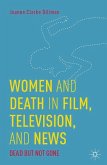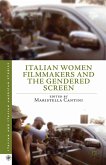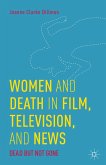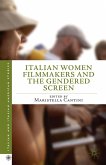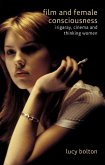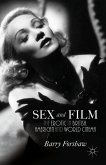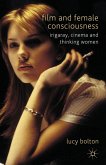The Lola film is a distinct subgenre of the woman's film in which woman's claim to pleasure is entertained without recourse to the figure of the femme fatale. Lola embodies a recognizable set of characteristics through which over time a select group of directors, actors, and audiences have responded in ways that do not succumb to the imperatives of gender. There are over thirty-five Lola films, starting with Marlene Dietrich in The Blue Angel: many are German, others are French, American, British, Italian, and Spanish, but her claim has also resonated in Argentina, China, Egypt, Mexico, Thailand, and the Philippines. Lola can be working class, lesbian, transgender, ethnic, suburban, or any combination. This book examines Lola as a specific and enduring aspect of the early twentieth-century "new woman": woman's forthright claim to pleasure on her own terms, liberated, if only as a cinematic fantasy, from the usual constraints of sex and gender.
"Richter's thought-provoking book offers lively analyses of the films. Summing Up: Recommended. Graduate students, researchers." - CHOICE
"Richter offers an original approach to thematic film criticism. The range of films chosen for the discussion is impressive and the interconnections and associations offered go beyond any expected comparative reading to uncover astonishing relationships. Rather than looking at individual films, he segments the book into individual themes, motifs, and gestures and then traces the development of these through a set of films that have picked up and developed the Lola story. This tracking of themes/gestures means moving beyond a plot-driven discussion to looking at a cultural transmission and transformation in an innovative and inspiring manner." - Elisabeth Bronfen, University of Zurich, Switzerland and author of Over Her Dead Body: Death, Femininity and the Aesthetic and Specters of War: Hollywood's Engagement with Military Conflict
"In this brilliant study of the 'Lola film,' Simon Richter explores more than thirty films that fashion and sustain a fantasy that acknowledges women's legitimate claims to sexual pleasure and autonomy. With eloquent clarity and undeniable passion for his subject, Richter sweeps aside sterile academic debates to show how the Lola figure transcends national traditions - there are Lola films in German, US, Chinese, Mexican, Argentinean, and Egyptian cinema - as well as sexual and gendered binaries" - Patrice Petro, former President, Society for Cinema and Media Studies, author of Aftershocks of the New: Feminism and Film History
"With insight and panache, Richter reveals 'Lola' as a transgressive force for female desire in cinema. His thoroughly enjoyable book defines a refreshing new genre - a provocative lens for 'Lolas' to come." - Ellen Seidler and Megan Siler, Co-directors of And Then Came Lola
"Richter's original approach to a character brings together familiar andless familiar texts. Situating them in this new paradigm allows him to forge innovative connections. Slightly irreverent, but thoroughly researched and with much attention to subtlety, Richter offers a tour-de-force through the different incarnations of the cinematic Lola . . . Richter's thorough training in German literature, ability for comprehensive research, gift of creative thinking, and love of Lola make Women, Pleasure, Film an original and provocative contribution to feminist film theory and German Studies." - German Studies Review
"Richter offers an original approach to thematic film criticism. The range of films chosen for the discussion is impressive and the interconnections and associations offered go beyond any expected comparative reading to uncover astonishing relationships. Rather than looking at individual films, he segments the book into individual themes, motifs, and gestures and then traces the development of these through a set of films that have picked up and developed the Lola story. This tracking of themes/gestures means moving beyond a plot-driven discussion to looking at a cultural transmission and transformation in an innovative and inspiring manner." - Elisabeth Bronfen, University of Zurich, Switzerland and author of Over Her Dead Body: Death, Femininity and the Aesthetic and Specters of War: Hollywood's Engagement with Military Conflict
"In this brilliant study of the 'Lola film,' Simon Richter explores more than thirty films that fashion and sustain a fantasy that acknowledges women's legitimate claims to sexual pleasure and autonomy. With eloquent clarity and undeniable passion for his subject, Richter sweeps aside sterile academic debates to show how the Lola figure transcends national traditions - there are Lola films in German, US, Chinese, Mexican, Argentinean, and Egyptian cinema - as well as sexual and gendered binaries" - Patrice Petro, former President, Society for Cinema and Media Studies, author of Aftershocks of the New: Feminism and Film History
"With insight and panache, Richter reveals 'Lola' as a transgressive force for female desire in cinema. His thoroughly enjoyable book defines a refreshing new genre - a provocative lens for 'Lolas' to come." - Ellen Seidler and Megan Siler, Co-directors of And Then Came Lola
"Richter's original approach to a character brings together familiar andless familiar texts. Situating them in this new paradigm allows him to forge innovative connections. Slightly irreverent, but thoroughly researched and with much attention to subtlety, Richter offers a tour-de-force through the different incarnations of the cinematic Lola . . . Richter's thorough training in German literature, ability for comprehensive research, gift of creative thinking, and love of Lola make Women, Pleasure, Film an original and provocative contribution to feminist film theory and German Studies." - German Studies Review


